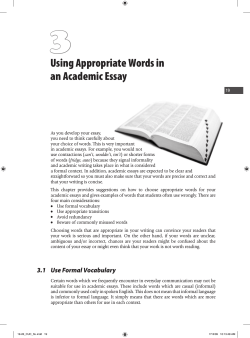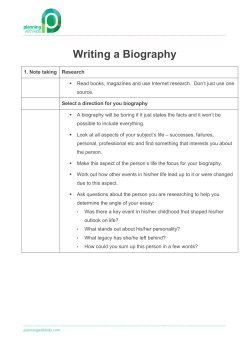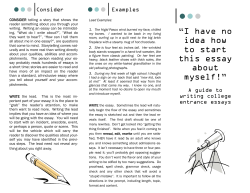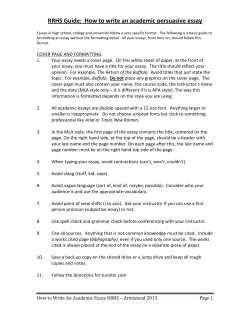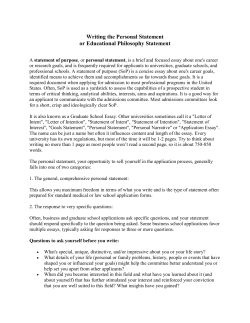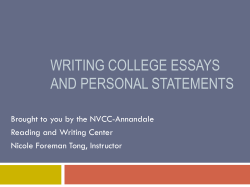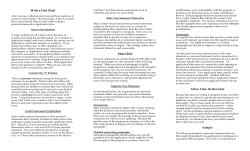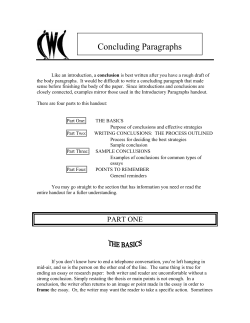
1 Writing an Academic Essay
1 3 Writing an Academic Essay Writing an Academic Essay The academic essay is one of the most common assignments you will be asked to write in the university. The essay is a reflection of how well you have understood the basic course material, how much extra work you have put into researching the essay topic and how analytical you have been in selecting and commenting on the material you use. Of course, your essay needs to be well written so that your reader can follow and appreciate your ideas. In short: Academic Essay = understanding of course + research + analysis + good writing There are seven main steps to writing a good essay. These are: Analyse your prompt ● Gather your information by research and reading ● Note where your information comes from ● Think of your thesis ● Organise your material ● Draft your essay ● Revise your essay ● This chapter explains the process of writing a good essay and suggests specific things you can do to write one. 1.1 Analyse Your Prompt The first thing to do is to look at the essay prompt (the essay question) carefully and decide what kind of essay you are being asked to write. 03-08_CUC_SL.indd 3 7/12/09 10:13:15 AM 1.1.1 Define your purpose Different essay prompts require you to do different things. Some essays need you to explain a concept, while others expect you to compare and/or contrast; yet others expect you to argue a position. Table 1 shows the main essay prompts: Writing an Academic Essay 4 Table 1: Essay Prompts If you are asked to… Then you will need to… Analyse Find some systematic or methodical way of categorising or defining a topic. Find the cause and effect of some phenomenon. Find the solution to a given problem. Argue Present your thesis — that is your stand and the reasons for it and persuade the reader by the points that you raise. Compare and/or contrast Focus on similarities and/or differences in a topic. Discuss Present your view of a topic; you need to choose your own focus. Explain Show how well you understand a topic or phenomenon. 1.1.2 Analyse the key words in the prompt Some words are significant and will need to be defined as part of your essay. In the example below, the key words are in bold: Surrogate motherhood should be legalised in all countries so that everyone has a chance to have their own children. Discuss. You will need a working definition of surrogate motherhood and legalised. A working definition is one that you will work with so you would choose one that suits your thesis. 1.1.3 Consider other important words in the prompt The other important words are ones which will affect how you delineate or gather your essay points. You could pick up on the words all, everyone and own children. You may ask if surrogacy would suit all countries in the world or who is meant by everyone — should these people include single people as well as couples and people of different sexual orientations? You may also ask why it is important to have one’s own children. In short, analysing the prompt in detail will have an impact on how you search for material and how you select and analyse it later. 03-08_CUC_SL.indd 4 The first thing is to look to do at the essa y promp t carefully an what kind d decide you are b of essay eing as to write. ked 7/12/09 10:13:15 AM 1.2 Gather Your Information by Research and Reading To gather information by reading, secondary research, you need to read selectively either from a recommended bibliography or read around the topic trying to ascertain which information could be most useful to your essay. 1.3 Note Where Your Information Comes From 5 Writing an Academic Essay Gathering information through interview, questionnaire, survey or laboratory experiments is called primary research. It involves collection of data which does not exist yet. You should have a good idea of how your essay will develop before you begin so that you can look for the appropriate amount or scope of information. It is an academic convention to acknowledge your sources and to distinguish where source information ends and your own original thinking begins. It is the academic way of showing that you are not plagiarising, i.e. stealing somebody else’s ideas, which is considered to be cheating. This particular convention is one of the key features that distinguishes an academic essay from other sorts of essays, for example, opinion pieces in newspapers. ➤ See Chapter 6: Using other people’s ideas for instructions on how to acknowledge your sources. As you research and read, keep careful notes about where your material comes from. You will need to know the author’s full name, the book or article title, the publisher, date and place of publication and any website details. 1.4 Think of Your Thesis It is now time to craft your essay. The most important idea in your essay is your central idea, which is called a thesis. The thesis controls the entire essay — all your main points will be a development of it, and all the minor supporting details will illustrate it. For the example essay prompt above, one thesis statement might be: Surrogate motherhood is a useful method for conceiving children, but should only be legalised where it is culturally appropriate to do so and for a clearly specified group of people. Make sure that the thesis expresses a controlling idea that is neither too broad nor too specific to develop effectively and that it does not simply state the obvious. ➤ See Chapter 2: Developing an academic essay for more tips on how to construct a good thesis statement. 03-08_CUC_SL.indd 5 7/12/09 10:13:16 AM 1.5 Organise Your Material A good essay is well-organised. It has a coherent structure that helps the reader make sense of the content. After gathering all the ideas, decide what to include in what order and how to let the reader know you are moving from one point to another. Writing an Academic Essay 6 You will need to identify your main ideas and make sure you can support each one sufficiently with details. Drawing an outline can give you a good visual picture of the final essay. Work out an outline that allows you to develop and support your thesis. This helps you to remember when you will use which points of the information you have gathered. This is useful in long academic essays to prevent you from digressing because of an interesting sub point, which might lead to a rambling essay. Table 2 and Table 3 below show templates of two ways your essay might be organised: Table 2: Template for a discursive essay In this section you will… Introduction ● ● ● ● ● Body paragraphs ● ● ● ● ● Conclusion provide a topic sentence which says what the main point of each paragraph is provide supporting details for your topic sentence (based on your research) synthesise what you have read; that is, show what different people think about the same point show some critical thinking; that is, tell the readers what you think of what you have read, and provide in-text citations for your information. ● recap your main points reiterate your thesis, and give your final word, if any. ● list the references for each of your in-text citations. ● ● References give brief background to the topic address definition of key words and issues state your thesis outline your main points, and provide transition into body paragraphs. tline Drawing an ou u can give yo icture a good visual p y. of the final essa 03-08_CUC_SL.indd 6 7/12/09 10:13:16 AM Table 3: Template for an argumentative essay In this section you will… Introduction ● ● ● ● ● Body paragraphs ● ● ● ● ● ● ● Conclusion ● recap your main points reiterate your thesis, and give your final word, if any. ● list the references for each of your in-text citations. ● ● References provide a topic sentence which says what the main point of each paragraph is provide supporting details for your topic sentence (based on your research) synthesise what you have read; that is, show what different people think about the same point show some critical thinking; that is, tell the readers what you think of what you have read present some counterarguments, if you think they are strong ones, to show you understand there is an opposing viewpoint, but… provide a refutation showing that you have an argument against that opposing viewpoint, and provide in-text citations for your information. Writing an Academic Essay ● 7 give brief background to the topic address definition of key words and issues state your thesis outline your main points delineate your argument showing what your stance is and how you will develop your ideas, and provide transition into body paragraphs. 1.6 Draft Your Essay Using your outline, write your essay — get all your thoughts down on paper. It does not have to be perfect first time. Use formal English and aim for an objective tone. Choose the most precise words and aim for a fluent and coherent style. When you are referring to sources, paraphrase and use reported speech rather than a lot of direct quotation. 03-08_CUC_SL.indd 7 7/12/09 10:13:16 AM 1.7 Revise Your Essay Revision consists of two steps: editing and proofreading. Writing an Academic Essay 8 Editing is the process of reading through your essay again and asking how well organised it is and how well your ideas are developed. Do you have an objective tone? Is your choice of words accurate? Is your writing concise? Are the links within and between paragraphs clear? ➤ See Chapter 3: Using appropriate words in an academic essay for advice on how to choose appropriate words in order to achieve a formal and objective tone and provide clear links between your paragraphs. The final step is proofreading your essay. Read through your essay slowly looking for obvious errors such as spelling, punctuation or grammar and correct them. It is easier to do this on a hard copy than a soft one. ➤ See Chapter 5: Proofreading an essay or report for guidelines for checking your essay. Before you submit, check if there are any specific submission details, such as the use of a specific font size, margins or double spacing. Conclusion To recap, an academic essay is the most common assessment of how much you have learned and thought about a topic for your course work. It has certain features in terms of content (researched or well argued based on fact and logic), organisation (controlled by a thesis and by the type of essay prompt you are responding to), language (formal and objective), which you will find out more about in Chapter 3, and using academic conventions to acknowledge sources, as explained in Chapter 6. You need to select information, synthesise it, and critique it. You should be prepared to write a first draft and to spend time improving it. Further reading Abrams, E. (2009). Essay structure. Retrieved on June 15, 2009, from http://www.fas.harvard.edu/ ~wricntr/documents/Structure.html Duffin, K. (2009). Overview of the academic essay. Retrieved on June 15, 2009, from http://www. fas.harvard.edu/~wricntr/documents/Overvu.html Lee, K.C., Goh, H., Chan, J., & Yang, Y. (2007). Effective college writing: A process genre approach. Singapore: McGraw-Hill. The OWL at Purdue (2009). OWL materials: Creating a thesis statement. Retrieved on June 16, 2009, from http://owl.english.purdue.edu/owl/resource/545/01/ Chapter contributed by LEE Gek Ling 03-08_CUC_SL.indd 8 7/12/09 10:13:16 AM
© Copyright 2025
